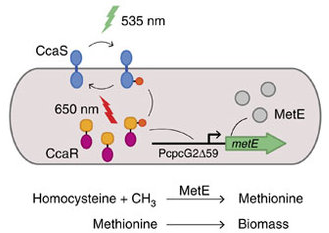What if you could program your bacteria to grow in any pattern you fancy? Researchers from ETH Zurich can, and this is huge news for the Biotech Industry!
 Scientists from ETH Zurich have developed a fully automated system that can precisely control bacterial growth using light. What’s more, unlike other prototypes, this system can adjust to any unpredicted day-to-day changes in culture conditions, like temperature or pH.
Scientists from ETH Zurich have developed a fully automated system that can precisely control bacterial growth using light. What’s more, unlike other prototypes, this system can adjust to any unpredicted day-to-day changes in culture conditions, like temperature or pH.

So how does it work? E. coli bacteria are genetically modified to express cyanobacterial genes CcaS and CcaR, which are activated with green light and deactivated with red wavelengths. These molecular sensors regulate the expression of any desired gene, in this case methionine synthase (MetE): an enzyme necessary for bacterial growth. A computer measures the density of bacteria in real time and makes the necessary light adjustments to control the desired output.
The key element is an algorithm that responds immediately to real-time changes in the culture. This makes the system robust and repeatable over long-term culture periods.
The researchers behind this prototype claim that optogenetics – the control of cells using light – is a great method for rapid, targeted, low-cost and precise regulation of biological processes. In addition, as opposed to small molecules inducers, light doesn’t interfere with other processes and has low toxicity.

By using an external computer to control bacterial behavior, the system can be easily applied to large-volume bioreactors. The scientists think that in the future the system could be improved to include the simultaneous control of several enzymes using different light colors.
This is the first fully automated system that can control growth precisely in spite of day-to-day variability. The possibilities are immense for industrial biotech, which could use it to inexpensively optimize production of any compounds, such as vitamins, antibiotics and bioplastics.
In addition, this kind of approach could also be explored in therapeutic applications by equipping cells with an internal control mechanism that responds to the cellular environment. Researchers are already developing SynBio tools to control behavior in mammalian cells that could improve the precision of vaccines, gene therapy or the popular CAR-T immunotherapies.





